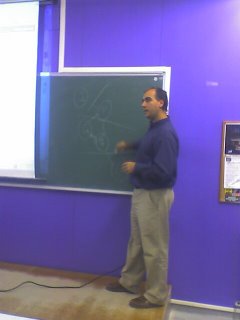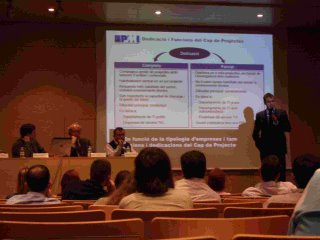Ara fa un anys, vaig tenir l'oportunitat d'assistir a una sessió de formació sobre "Lideratge Emocional", a Navacerrada.
Tot i que me seria díficil descriure què hi vam aprendre o enumerar la majoria dels temes previstos, el cert és que tant jo com els altres participants, vam tornar amb un alt grau de motivació.
Un dels exercicis que vam dur a terme, i que he anat utilitzant en els seminaris de formació que duc a terme en l'àmbit de Direcció d'Equips de Treball, consisteix en identificar 4 perfils de 'personalitat'.
A partir d'una autoenquesta els participants identifiquen quin són els seus principals trets de 'personalitat' sobre 4 arquetipus.
Cadascun d'aquests perfil respón a unes actituds i maneres d'enfocar-se davant la resolució de problemes, la seva interrelació amb altres persones o la manera de respondre davant situacions de conflicte.
Aquests quatre perfils corresponenien a quatre possibles animals, "Aliga", "Lleó", "Mussol" o "Gos" o també a quatre possibles 'nacionalitats': nòrdincs, nordamericans, sudamericans o els habitants del sud d'Espanya.
Com a bon Director d'un Equip de Treball, cal conèixer el perfil dels nostres membres a l'hora de preveure conflictes entre ells, o per treure'n el màxim profit davant diferents situacions.
També és important saber-ho a l'hora de relacionar-nos amb ells.
I a què ve aquestes notes de 'nostàlgia'?
Simplement, que en el Dossier Econòmic de Catalunya, del dissabte 23 de desembre hi havia una referència a una empresa de formació, Grow! que portava per títol "Quatre colors per a la formació empresarial".
El model que aplica aquesta empresa consisteix en associar els quatre perfils de personalitat els colors blau, vermell, verd i groc, respectivament.
Tal i com comenta un dels entrevistats a l'article, 'Saber com som i quin és el nostre comportament, i alhora coneixer millor com són els altres ens ajuda a crear estratègies de comunicació més efectives i a millorar els entorns laborals'.
El blau és per aquelles persones més analítiques, el vermell per als que tendeixen a ser més directes i resolutius; el verd per als conciliadors i el groc per als mes comunicatius i espontanis.
'Tots tenim una mica dels quatre colors, però sempre n'hi ha un que predomina, i saber identificar quin és ens pot ajudar a buscar la manera més eficient de relacionar-nos.
I vosaltres, quin color sou?
En tot cas, siguem quin siguem, sempre és important fer-ne la reflexió corresponent.
2006/12/31
2006/12/22
Great Mistakes in Technical Leadership
Some days ago, one of the my "past students" at the University, Carlos Ruiz, sent to me an interesting url address to the article "Great Mistakes in Technical Leadership".
It is a very, very interesting article.
Please, read it: http://www.hacknot.info/hacknot/action/showEntry?eid=87
And just only as a summary, these are the 18 mistakes:
Mistake #1: Isolating yourself from the team
Mistake #2: Employing hokey motivation techniques
Mistake #3: Not providing technical direction and context
Mistake #4: Fulfilling your own needs via the team
Mistake #5: Focusing on your individual contribution
Mistake #6: Trying to be technically omniscient
Mistake #7: Failing to delegate effectively
Mistake #8: Being ignorant of your own shortcomings
Mistake #9: Failing to represent the best interests of your team
Mistake #10: Failing to anticipate
Mistake #11: Repeat mistakes others have already made
Mistake #12: Using the project to pursue your own technical interests
Mistake #13: Not maintaining technical involvement
Mistake #14: Playing the game rather than focusing on the target
Mistake #15: Avoiding conflict
Mistake #16: Putting the project before the people
Mistake #17: Expecting everyone to think and act like you
Mistake #18: Failing to demonstrate compassion
Enjoy it!
It is a very, very interesting article.
Please, read it: http://www.hacknot.info/hacknot/action/showEntry?eid=87
And just only as a summary, these are the 18 mistakes:
Mistake #1: Isolating yourself from the team
Mistake #2: Employing hokey motivation techniques
Mistake #3: Not providing technical direction and context
Mistake #4: Fulfilling your own needs via the team
Mistake #5: Focusing on your individual contribution
Mistake #6: Trying to be technically omniscient
Mistake #7: Failing to delegate effectively
Mistake #8: Being ignorant of your own shortcomings
Mistake #9: Failing to represent the best interests of your team
Mistake #10: Failing to anticipate
Mistake #11: Repeat mistakes others have already made
Mistake #12: Using the project to pursue your own technical interests
Mistake #13: Not maintaining technical involvement
Mistake #14: Playing the game rather than focusing on the target
Mistake #15: Avoiding conflict
Mistake #16: Putting the project before the people
Mistake #17: Expecting everyone to think and act like you
Mistake #18: Failing to demonstrate compassion
Enjoy it!
2006/12/02
Toni Monte and "Project Management Framework"
 Last Wednesday I asked Toni Monte, a very friend of mine, to participate at one University lesson, into the subject "Project and Information Systems Planification and Management".
Last Wednesday I asked Toni Monte, a very friend of mine, to participate at one University lesson, into the subject "Project and Information Systems Planification and Management".Toni has a degree in Telecomunications Engineering for the UPC and is Master in Project Management for the La Salle.
He presented the Neoris Framework, a set of the process modeling, documents and best practices that this company defined for some of their main processess or activities, like Software Development or Project Management.
He showed the students how this company prepared all this work, the main activities they did and how it was disseminated and adopted by all the people at the organization.
This work spent one year of several people of the organization for the first version of this framework, and more than one year to prepare the second one.
 At this moment, Toni is the Responsible for the development of the different versions of Upcplus.com (www.upcplus.com), an elearning and collaboration platform, that is beeing used by some companies in Spain and SouthAmerica.
At this moment, Toni is the Responsible for the development of the different versions of Upcplus.com (www.upcplus.com), an elearning and collaboration platform, that is beeing used by some companies in Spain and SouthAmerica.Before of this, Toni was Project Manager and several companies (Software Engineering, IT Consultancy,...).
This presentation was a very good way to show the student how a company applied all the concepts and processes we are studing at class.
Porta22, 'the role of Project Manager'
 On Monday, 27th of November, I had the chance to participate in a workshop, organized by the Porta 22 - www.porta22.com - (BarcelonaActiva) around the role of the "Project Manager".
On Monday, 27th of November, I had the chance to participate in a workshop, organized by the Porta 22 - www.porta22.com - (BarcelonaActiva) around the role of the "Project Manager".They invited some members of the Chapter of PMI
 Barcelona (www.pmi-bcn.org), who presented to the assistants (more than 70) the different aspects of the Project Management 'profession'.
Barcelona (www.pmi-bcn.org), who presented to the assistants (more than 70) the different aspects of the Project Management 'profession'.First of all, Marc Serer, explained them what is
 the Project Management International Organization, www.pmi.org, and how to become member of it.
the Project Management International Organization, www.pmi.org, and how to become member of it.After that, Enrique Bolon, talked about the role and work of the Project Manager at the Construction Sector.
I presented the same aspects but ivolved in the IT (Information Tecnologies) Projects, and finally, Albert Cubeles talked about the professional carreer of a Project Manager, the international certification of the PMI, the PMP credential (Project Management Professional), the way to obtain it and the options to learn the PMBOK.
In my case, I talked about different methodologies to use on the IT Projects, like Metrica and Microsoft Solutions Framework, the main obstacles Project Managers found when they manage this type of projects, and I presented, also, the most usual 'stakeholders' and 'professional roles' involved in the ICT Projects (Information and Communication Technologies).
Suscribirse a:
Entradas (Atom)